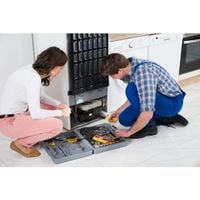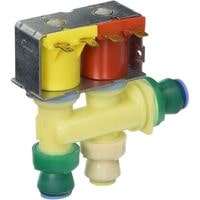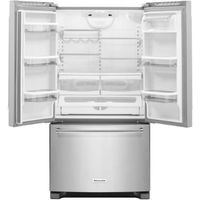Kitchenaid refrigerator noise. Our KitchenAid refrigerator makes a pretty loud humming noise. At first, we didn’t notice it too terribly much, but it does get a little irritating after a while. Now that I’m writing this article, though.
I guess that’s probably not good for you (or the fridge’s motor) overtime to hear the notebook fans whirring away like that all day long but then again, what do I know?
The Internet’s full of info about troubleshooting your KitchenAid, so let’s try some of those troubleshooting tips from our experts and see how you can minimize extra noise in your kitchen.
Kitchenaid refrigerator noise

If the ice maker isn’t hitting a water line, it will emit a buzzing or clicking sound. If there is kinking in the lines and the ice starts screeching while being dispensed, you may have to re-align the water valve with the supply line.
If doors are rubbing against surrounding surfaces and they begin squeaking while opening or closing, simply realigning hinges will alleviate the problem.
Here are some common issues and how to fix them we are discussed below stay with us.
Noisy Air Vent rattling
when you notice that some of the items in your fridge have been knocked around during delivery and need to be regrouped again. Some items may have run into the walls by accident.
So you’ll want to organize them a little more carefully this time so they don’t cause any more disruptions in the area where they line up against.
Watch out for blocking spaces and gaps as well when loading up shelves with food to avoid making any loud metal-on-metal noises.
Fan blade may be at fault
If your refrigerator is making strange noises, you probably have an issue with either the evaporator or condenser fan blade.
Check the fan blades in the back of your freezer for obstructions or to see if there are any external things rubbing it, such as dust or hair.
If that’s not the case and no obstructions can be found, check the fan blades on top of your refrigerator where they face out towards the kitchen.
Defective Water Inlet Valve

If a refrigerator is on the loud side, it might be because of the water inlet valve.
The water inlet supply pipe controls water input to your refrigerator; without water, nothing will pump which results in the sound coming from your ice maker.
The best way to fix this issue is by replacing it because there are different types of mechanisms that can cause these sorts of problems and many just don’t last as long as they should.
If a repair seems like something you’ve got to tackle yourself, think again. There have been some reports where people attempted getting into the machine themselves and once inside didn’t know what they were seeing so when they continued with their attempt to solve their problem – this caused them to end up with worse issues and costly repairs.
The compressor is making noise
If you hear a humming sound coming from the back of your refrigerator, it could be due to the refrigerator’s compressor being worn.
A noisy compressor is actually an indicator that wear and tear have taken over or that it’s malfunctioning and thus needs repair.
Compressors are usually found underneath the fridge close to the back and they can usually last for years after they begin making clunking noises.
If your compressor is on the fritz, then we suggest going ahead and replacing it by hiring a licensed professional.
Faulty Evaporator Fan Motor
If the evaporator fan in your fridge is making a lot of noise, follow these steps to fix the problem:
Unplug the refrigerator from the wall, remove the panels on the rear of the fridge, and turn off the water supply valve if it’s connected to this waterline.
Now, disconnect any hoses or electrical connections from both sides of the evaporator and then disconnect it as well.
After you have removed all necessary parts and screws, you will be able to access and replace the evaporator fan motor.
An issue with Condenser Fan Motor
It’s important to always clean the condenser coil. Over time, dust and grime can build upon it and if not maintained could lead to poor cooling performance or even motor failures.
This is due to the fact that as the motor is designed to pull in cool air from underneath the refrigerator, any dust or grime that builds up around the cooling coils will keep it from being able to do so efficiently.
The solution for dislodging any items that may be caught in the condenser fan blades would be to unplug the refrigerator before locating a safe source of compressed air in order to blast away debris that might be caught in potential damage by rotating fan blades.
It can also help dislodge debris if you have access to a hose attachment rated at a high pressure capable of blasting water (not a high-pressure washer).
The second method involves removing the rear panel so you can more easily access the magnetic condenser fan motor itself.
Kitchenaid refrigerator noise
Related Guides
